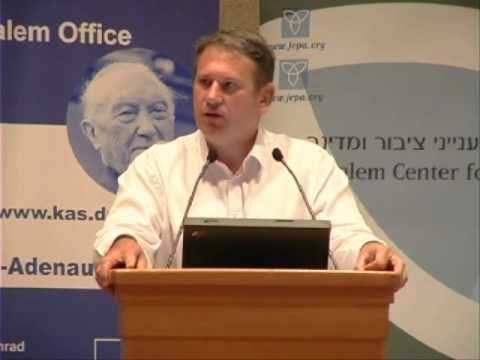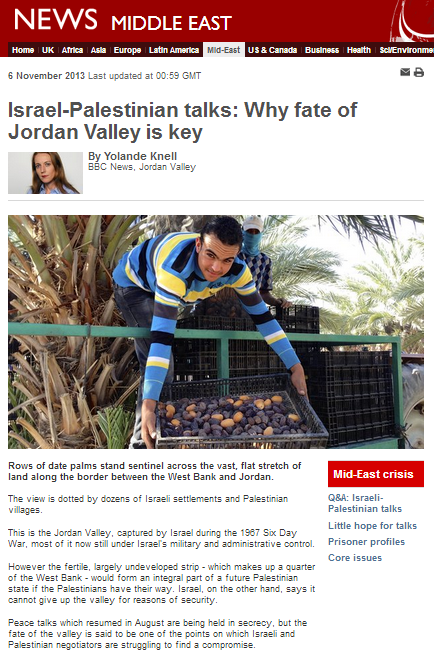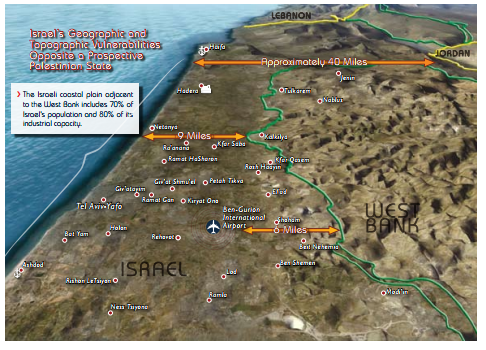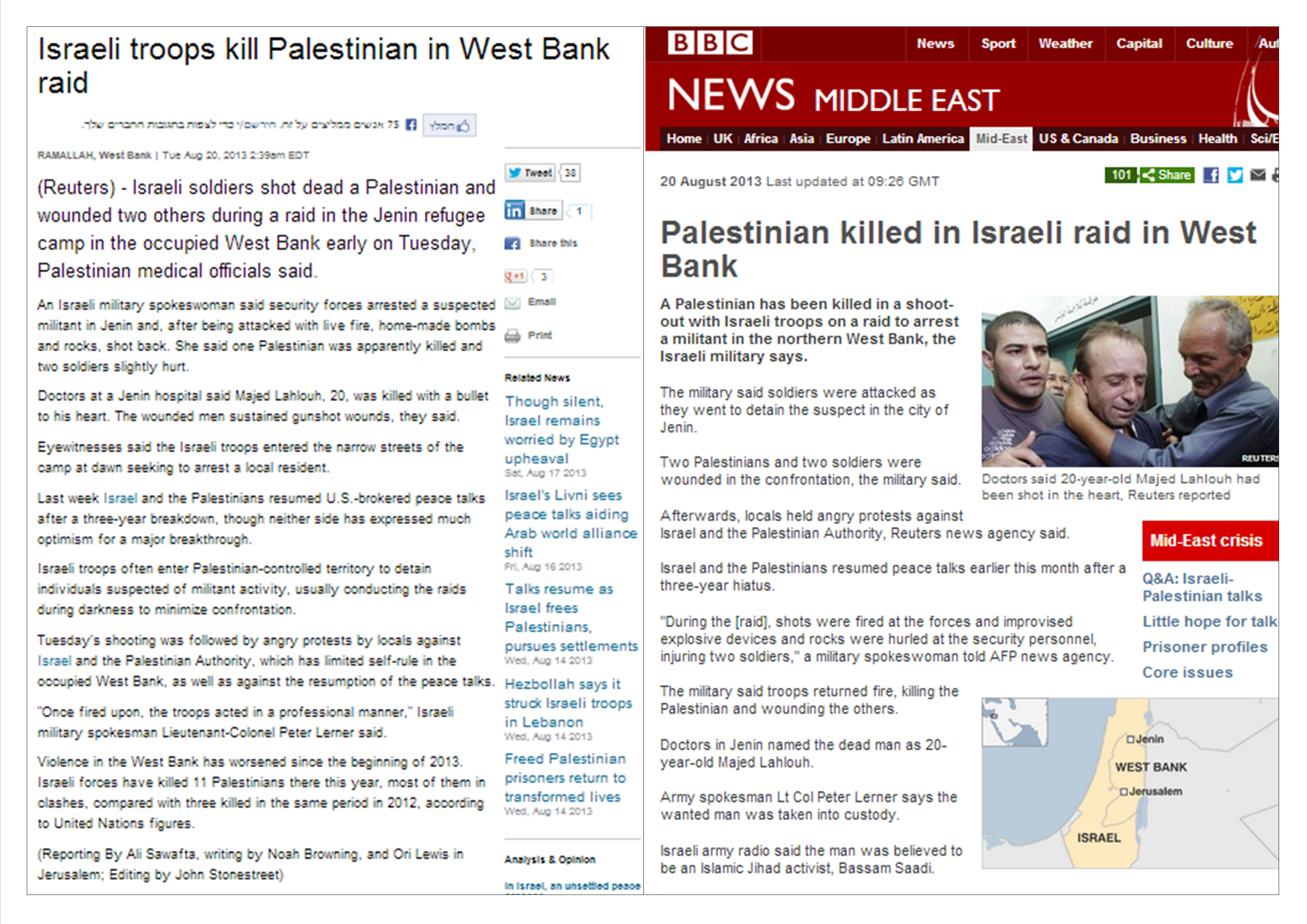If – as promised on the packaging – BBC audiences are to be able to “participate in the global debate on significant international issues”, they obviously need to be made aware of the full range of factors surrounding any specific issue.
On November 6th an article by Yolande Knell titled “Israel-Palestinian talks: Why fate of Jordan Valley is key” appeared in the ‘Features & Analysis’ section of the BBC News website’s Middle East page.
Knell’s article includes several photographs, a filmed report and a map and is 1,372 words long. Over six hundred of those words are devoted to the presentation of the Palestinian view of the issue. Around three hundred and fifty words are taken up by general information and some four hundred words ostensibly present the Israeli view of the subject.
In her introduction Knell states:
“This is the Jordan Valley, captured by Israel during the 1967 Six Day War, most of it now still under Israel’s military and administrative control.”
Only much later on in the article does she explain that the Jordan Rift Valley (as it is more precisely termed) is part of Area C under the terms of the Oslo Accords – which were of course signed by the representatives of the Palestinian people – but no mention is made of the fact that the area was occupied by Jordan for 19 years after its attack on the nascent Jewish State in 1948. 
Naturally, Knell inserts the following pro forma BBC statement, with no attempt made to inform readers of the range of legal opinions on the subject besides that of Israel.
“The settlements are widely seen as a breach of international law, although Israel rejects this.”
Quoting Mahmoud Abbas, she makes no attempt to clarify to her audience that in fact the 1949 armistice lines are not a “border”.
” “The eastern borders of the Palestinian state, stretching from the Dead Sea, through the Jordan Valley and the central highlands, to the borders of Bisan [Beit Shean in northern Israel] are Palestinian-Jordanian borders and will remain so,” he [Abbas] said.”
So how does Knell present Israeli concerns surrounding the future of the Jordan Rift Valley to her audience? In her introduction, Knell states:
“Israel, on the other hand, says it cannot give up the valley for reasons of security.”
So far, so good. Clearly the next step should be to explain to BBC audiences what those “reasons of security” actually are.
Knell quotes the head of the local area council:
“We are the people that the government sent to settle the Jordan Valley,” says David Elhayani, who chairs a regional council, representing more than 20 settlements.
“As a Jew, I tell you we can’t take any risks. The Jordan Valley has to remain under Israeli sovereignty. I’m not talking about our claims from the Bible. I’m talking about safety. By staying here we protect the people in Tel Aviv and all of Israel.”
“Something will happen between the Arab countries and Israel, this will be the defence line.”
So readers now know that the head of the regional council regards the Jordan Rift Valley as a buffer zone between potential invaders, but they are given no explanation as to the rationale behind his statement, such as the fact that 70% of Israel’s population and 80% of its industrial capacity is located in the main conurbations lying on the low ground between the highlands of Judea & Samaria and the Mediterranean coast.
Later, Knell quotes the Israeli prime minister:
“In October, on the anniversary of the assassination of one of his predecessors, Yitzhak Rabin, the Israeli Prime Minister Benjamin Netanyahu told a Knesset meeting, “Our strength is the guarantee for our existence and peace… This requires a security border in the Jordan Valley, as Rabin said in his last speech.” “
Again, readers receive no explanation regarding the reasoning behind that approach.
Knell then notes proposals which have been made by various parties:
“In previous inconclusive peace talks, it is said a tentative deal was reached on setting up a few Israeli-manned early warning stations in the Jordan Valley.
However Mr Netanyahu is now said to favour a much stronger presence even within the framework of a Palestinian state.
Israeli media report that he plans to build a new security barrier in the Jordan Valley and rejects an idea favoured by his chief negotiator, Tzipi Livni, to introduce international forces to guard the border.”
Knell goes on to quote former ambassador Dore Gold of the JCPA:
” “Our experience has been that international forces just don’t do the job,” says Dore Gold, president of the Jerusalem Centre for Public Affairs. He points to the limitations of Unifil, which was given responsibility for the southern Lebanon border after the 2006 war.”
Contrary to Knell’s assertion, UNIFIL has been on the ground in Lebanon since March 1978 – not since August 2006 – and the very fact that Hizballah was able to conduct cross-border raids (including the one which sparked the second Lebanon war in July 2006) under the nose of UNIFIL is testimony enough to its impotency. The trouble is, however, that BBC audiences have little or no understanding of what Knell euphemistically terms the “limitations” of UNIFIL because the BBC systematically fails to report on the international community’s inability to adequately implement its own UN resolutions of which the UNIFIL force is but one element.
Knell’s quote from Dr Gold ends with the following:
“But giving up the security of the Jordan Valley in a Middle East that’s full of chaos? Who knows what’s going to happen to Syria – maybe we’ll have a new jihad stand to our east – that’s a major worry for the Israeli army today.”
Knell does not bother to elaborate in terms of history – which shows that the border running along the Jordan Rift Valley has been breached by foreign armies belonging both to states neighbouring Israel and from further afield on past occasions. Neither does she expand on the subject of the uncertain future of the already turbulent Middle East and the far-reaching implications for Israeli security.
Clearly, BBC audiences have learned little from this feature which will contribute to their understanding of the strategic importance of the Jordan Rift Valley or enhance their ability to “participate in the global debate on significant international issues”.
Here is a short film from the JCPA which explains some of the issues skirted over by Yolande Knell.







